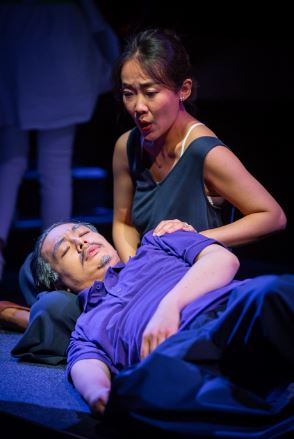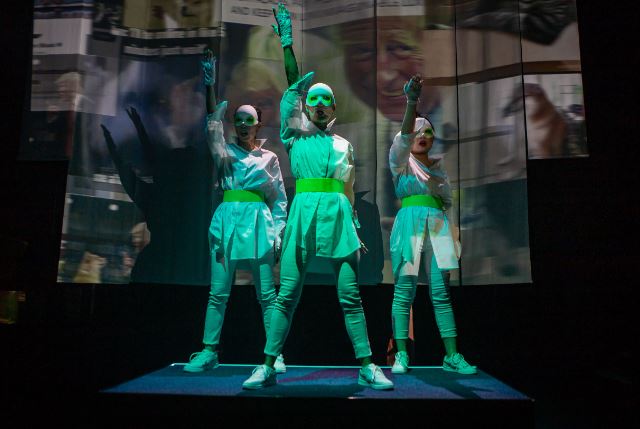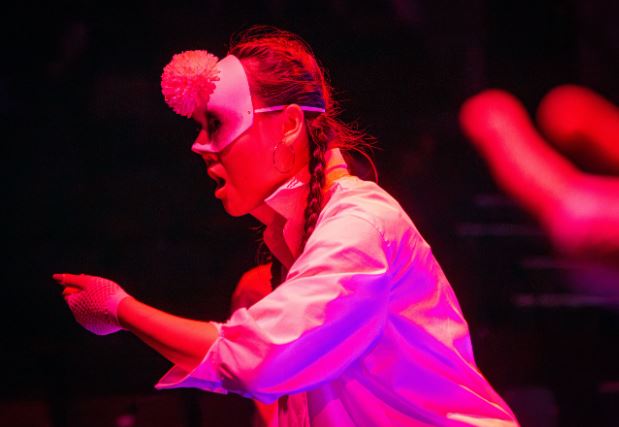Turandot
Extreme Opera @ Turandot Com
Turandot
Music by Giacomo Puccini, libretto by Giuseppe Adami and Renato Simoni, based on a fable by Carlo Gozzi
The Opera Makers and Ellandar at the Arcola Theatre, part of the Grimeborn Festival, until 26th August
Review by Patrick Shorrock
Puccini’s Turandot is extreme opera in every sense. It’s an astonishing score that blends orientalist chinoiserie with an Italian lyricism that has been twisted out of shape by erotic obsession and affronts conventional tonality every bit as much as the Tristan chord. And the lead roles are, if anything, even harder to sing than Wagner. On top of that, they are both monsters in their own way: Turandot, in response to an act of rape thousands of years ago, insisting on the slaughter of men who want to marry her if they fail to answer her riddles; and Calaf – so obsessed with getting Turandot to love him, after he has answered her riddles – that he is prepared to endanger the life of his father and his devoted servant by offering himself up for execution if she can find out his name. Was it any wonder that Puccini was unable to complete the opera and failed to provide the overwhelming love duet that might provide some kind of rationale for their behaviour?
Turandot, with its big chorus and requirement for vast spectacle, certainly isn’t the kind of opera that you expect to see at the intimate Arcola. Hearing Puccini’s amazing score stripped to its bare bones with largely piano accompaniment emphasises just how weird and discordant it is in an utterly fascinating way. Congratulations to Musical Directors, Panaretos Kyriatzidis and Thomas Ang for keeping it all together. The audience was thrilled.
There is a chorus of twenty – a lot to fit onto the Arcola stage. The closeness to the audience makes it uncomfortably clear how willing Calaf is to abandon his father and Liu in his pursuit of Turandot. In a bid to subvert western imperialist stereotyping, Ping, Pang, and Pong become Xiang, Feng, and Ming, and are played by women not men, which means that they can also sing the parts written for boys’ choir. This transposition worked astonishingly well.
Co-directors Becca Marriot and Iskandar Sharuzuddin were determined to challenge stereotypes and managed to employ an entirely East Asian cast, which was an impressive feat. I’m all in favour of giving more opportunities to ethnically diverse casts, but worry that, if opera roles are only able to be sung by the ‘right’ skin colour, we shall all be the poorer for it. I wouldn’t want a world in which the only Verdi role available to Leontyne Price was Aida or where Victoria De Los Angeles wasn’t allowed to sing Butterfly. But this production very effectively made the point that opera would benefit from making more use of the talents of East Asian singers – and not only in East Asian roles.
In this production, the opera becomes a monstrous video game (with impressively varied designs by Erin Guan) where people wear masks that function as headsets to connect them to this alternative reality. (Having the Prince of Persia as a minor character was an absolute gift that even this non-gamer appreciated!) The programme note rightly denounces the stereotyping of oriental women as either wholly submissive (Liu) or cruelly savage (Turandot), although I suspect that western misogyny and Madonna-whore complexes are just as much to blame for the sexual stereotypes in Puccini as orientalism.
But this is certainly an interesting take, with Liu as a much more central figure than usual. Heming Li is outstanding and outclasses all the other singers in a role that may suit a lighter voice but still expose any vocal weaknesses: she is unfailingly sweet and secure, without wobble even during the long exposed high notes. James Liu’s Calaf is rather baritonal and audibly cautious in his approach to the high notes (although that was far better than belting them in this small auditorium). Reiko Fukada’s Turandot produces some shrill noises that are the kind of thing that gives opera a bad name. But just having the notes in this almost unsingable role, where many famous sopranos have sounded pretty uncomfortable, is still an achievement. (Katia Ricciarelli’s ghastly wobbles in the Karajan Turandot recording are not something that I ever wish to hear again.) Fukada’s gestures are oddly mannered and unconvincing – possibly to indicate that she is a computer-generated phenomenon. I wonder if using a recording and a mime artist might be more effective, although rather difficult to do in conjunction with real life artists.
The issue of how to handle this incomplete score is adroitly done. None of the completions that I have heard quite work, so this one stops where Puccini does. Probably just as well when there was no interval, and it was excruciatingly hot – like the Albert Hall before it got air conditioning. Liu sings her final words not to Turandot but to Calaf. Instead of committing suicide, she throws her engagement ring at him and walks out. This has the shock impact of Nora slamming the door at the end of A Doll’s House, although it does feel a bit confusing, as it comes from nowhere and the production doesn’t always clearly distinguish between reality and computer-generated fantasy. But that is probably what happens if you spend too much time playing video games. Or even going to the opera.
Patrick Shorrock, August 2023
Photography by Ingrid Hu




Trackbacks & Pingbacks